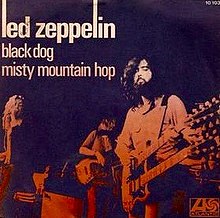Misty Mountain Hop
| "Misty Mountain Hop" | ||||
|---|---|---|---|---|

French single picture sleeve
|
||||
| Single by Led Zeppelin | ||||
| from the album Led Zeppelin IV | ||||
| A-side | "Black Dog" | |||
| Released | 2 December 1971 (US) | |||
| Format | 7-inch 45 rpm | |||
| Recorded | Headley Grange, Headley, England, 1971 | |||
| Genre | Hard rock | |||
| Length | 4:39 | |||
| Label | Atlantic | |||
| Writer(s) | ||||
| Producer(s) | Jimmy Page | |||
| ISWC | T-070.113.072-4 | |||
| Led Zeppelin singles chronology | ||||
|
||||
"Misty Mountain Hop" is a song from English rock band Led Zeppelin's untitled fourth album, released in 1971. In the United States and Australia it was the B-side of the "Black Dog" single, but still received considerable FM radio airplay. It was recorded at Headley Grange, a mansion with a recording studio in Hampshire, England, where the band sometimes lived.
The song is a medium tempo rocker which begins with bassist John Paul Jones on Hohner electric piano. The basic structure developed from a riff Jimmy Page came up with which was enhanced by John Paul Jones, whose electric piano introduces the theme on the finished track. It is notable for the presence of layered, melodic guitar and keyboard parts. The song features a memorable riff, on which Page and Jones harmonize using keyboard and guitar. This repeating riff, heard on the bass guitar, is based on the notes A G E and sounds like a funk rock bassline. At 2:11, in the second half of the second verse, the band members briefly fall out of sync with one another. However, the band felt that the rest of the take was too good to discard the recording.
The most common interpretation of the song's title involves a reference to the Misty Mountains in J. R. R. Tolkien's The Hobbit. The lyrics refer to the events of the 7 July 1968 "Legalise Pot Rally" in Hyde Park, London, in which police made arrests for marijuana possession. The lyrics reflect Plant's quest for a better society, a place and time when hangups are replaced with individual freedom and a life of mutual support and rapport.
The song also appeared as a Led Zeppelin track in the 1997 Time-Life 6-CD boxed set Gold And Platinum: The Ultimate Rock Collection, marking one of the rare times that a recording by the band has been included in a various artists compilation.
...
Wikipedia
